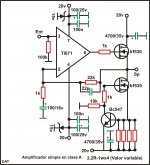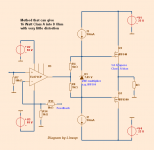you have limited the TL071 supply to +-15Vdc.
This will result in ~14Vpk maximum output.
Why run the two mosFETs on +-20Vdc?
The lower mosFET looks like it is passing ~1A.
This is the maximum ClassA current that a single ended CCS loaded amplifier can deliver.
The amp will clip if you ask for 1Apk of output.
The maximum ClassA is ~4W into 8r0.
If you increase the CCS current to ~1.4A, then you can push ~8W of ClassA into an 8r0 load.
This will result in ~14Vpk maximum output.
Why run the two mosFETs on +-20Vdc?
The lower mosFET looks like it is passing ~1A.
This is the maximum ClassA current that a single ended CCS loaded amplifier can deliver.
The amp will clip if you ask for 1Apk of output.
The maximum ClassA is ~4W into 8r0.
If you increase the CCS current to ~1.4A, then you can push ~8W of ClassA into an 8r0 load.
It is good if you could use +-18V for the opamp.
Like Andrew said.
And this would not only give chance to more Watt
but also improve the performance of op-amp.
Like Andrew said.
And this would not only give chance to more Watt
but also improve the performance of op-amp.
T
Thanks lineup and andrewt.
I want improve this.
when exchange te output mosfet too enchange the consumption current!!
Thanks again
Thanks lineup and andrewt.
I want improve this.
when exchange te output mosfet too enchange the consumption current!!
Thanks again
I did some testing in SPICE
to see how we can squeeze power out of TL071 as driver.
I finally got to 16 Watt rms into 8 Ohm.
That is +-16 Volt peak.
And there is not much more to get from OP-Amp supplied by +-18V.
The output stage in my simplified diagram is at 22 Volt.
Possibly 21 Volt would be enough ....
The output is IRF540/9540 in Push-Pull, and at 1.0 Ampere Class A.
2 Current sources bias the MOSFETS and one IRF510 sets the 1A current.
The op-amp TL071 controls the output stage via two 1k resistors.
The distortion figures I got are very low.
Readings like THD 0.00008% at 1 Watt
As op-amps have very low THD
this also sets the level for any amplifier controlled by op-amps.
Here you are 🙂
to see how we can squeeze power out of TL071 as driver.
I finally got to 16 Watt rms into 8 Ohm.
That is +-16 Volt peak.
And there is not much more to get from OP-Amp supplied by +-18V.
The output stage in my simplified diagram is at 22 Volt.
Possibly 21 Volt would be enough ....
The output is IRF540/9540 in Push-Pull, and at 1.0 Ampere Class A.
2 Current sources bias the MOSFETS and one IRF510 sets the 1A current.
The op-amp TL071 controls the output stage via two 1k resistors.
The distortion figures I got are very low.
Readings like THD 0.00008% at 1 Watt
As op-amps have very low THD
this also sets the level for any amplifier controlled by op-amps.
Here you are 🙂
Attachments
I did some testing in SPICE
to see how we can squeeze power out of TL071 as driver.
I finally got to 16 Watt rms into 8 Ohm.
That is +-16 Volt peak.
And there is not much more to get from OP-Amp supplied by +-18V.
The output stage in my simplified diagram is at 22 Volt.
Possibly 21 Volt would be enough ....
The output is IRF540/9540 in Push-Pull, and at 1.0 Ampere Class A.
2 Current sources bias the MOSFETS and one IRF510 sets the 1A current.
The op-amp TL071 controls the output stage via two 1k resistors.
The distortion figures I got are very low.
Readings like THD 0.00008% at 1 Watt
As op-amps have very low THD
this also sets the level for any amplifier controlled by op-amps.
Here you are 🙂
Hi line up,
It seems that you change/arrange the final from SE Follower to Push Pull Follower. Does it mean that PP has better sound signature (e.g. speed/dymanic) than original SE, other than its power (off course, PP has much power than SE)?
What about Common Source, I think with the same circuit, it can be arranged to Common source too, just change the Vbe multiplier to get Vgs around 4 volt.
About the Iq, does it matter to increase to 1A, as the MOSFET is already "On" with lower bias (e.g. 250mA) to be Class A, and VGs will never go down due to signal swing to make MOSFET "Off"? (CMIIW).
Thanks,
Ervin L
your single ended proposal can have output current upto the bias current. It can go no higher. All of this output is ClassA.
Push Pull can output ClassA current upto twice the bias current. That allows one to reduce the bias current for the same ClassA output as the single ended.
The big difference is that the Push Pull is not limited to twice bias for maximum output current. The stage will move to ClassAB when the ClassA limit is exceeded. Very high peak transient currents can be supplied from the ClassAB stage and the main music and small peaks can be met by the ClassA current. The amp sounds nice and does overload on current limit.
That does not necessarily make Push Pull better than Single Ended. They are just different ways to a similar answer.
Push Pull can output ClassA current upto twice the bias current. That allows one to reduce the bias current for the same ClassA output as the single ended.
The big difference is that the Push Pull is not limited to twice bias for maximum output current. The stage will move to ClassAB when the ClassA limit is exceeded. Very high peak transient currents can be supplied from the ClassAB stage and the main music and small peaks can be met by the ClassA current. The amp sounds nice and does overload on current limit.
That does not necessarily make Push Pull better than Single Ended. They are just different ways to a similar answer.
- Status
- Not open for further replies.
- Home
- Amplifiers
- Solid State
- My easy class a amp.

